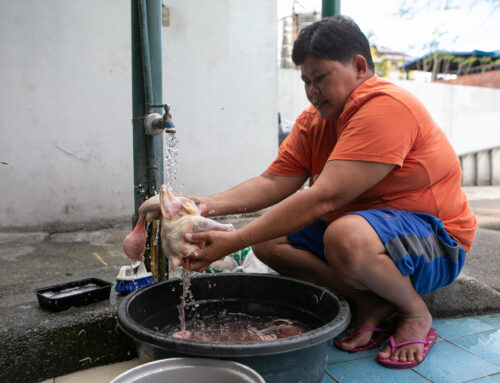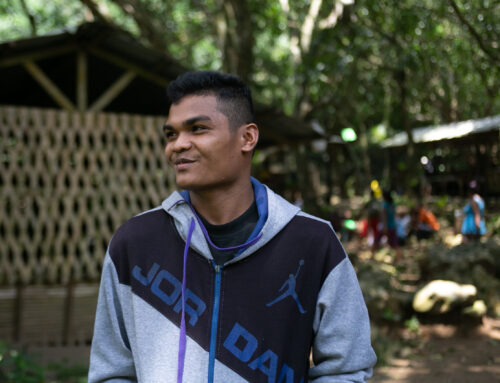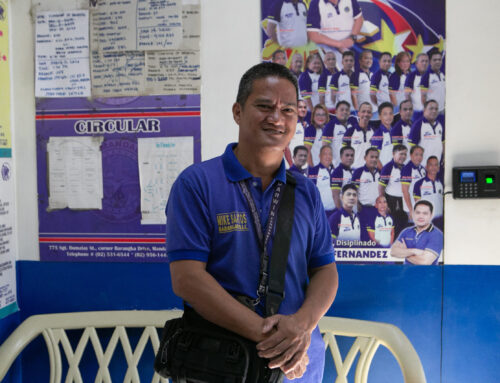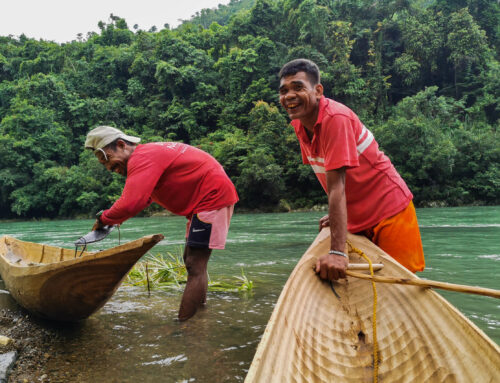“Who would need a concrete house, if this would entail losing our ancestral land? I can’t imagine what would happen to my 10 children and my grandchildren if they push us away from our land. If the project pushes through, what will be left of their future?
Amy Astoveza
50 years old, Baycuran, Sitio Queborosa, Barangay Magsaysay, Infanta, Quezon
Writer and Photographer: Gigie Cruz
I am Amy Astoveza. I am against the Kaliwa Dam Project. I am willing to die fighting for my rights as a Dumagat. We will stand for our rights and fight this project.
We’ve been hearing about the project for quite a long time and have expressed our opposition to the project since the news came out.
They gave assurance that things would improve in Queborosa and life would be a lot better. The dam’s impact would be minimal, they added; but how could there be a minimal impact if Queborosa lies at the center of the project? They will flatten our land as part of the project site. It will be turned into a facility for the project’s heavy equipment.
Word came out that those opposed to the project will not be given housing benefits or employment as compensation to the residents’ impending displacement. This information came from those who have interacted with representatives of the Metropolitan Waterworks and Sewerage Systems (MWSS).
How about us who have lived our entire lives in the mountains? Our lives are deeply rooted to the forest, what would happen to us if they take away our land?
I, along with other Dumagat people are oppose to the Kaliwa Dam project.
Who would need a concrete house, if this would entail losing our ancestral land? I can’t imagine what would happen to my 10 children and my grandchildren if they push us away from our land. If the project pushes through, what will be left of their future?
The Sierra Madre mountains are very important to us Dumagats. We live freely in the mountains. Her bosom provides us food; we survive through her gifts. We gather rattan, plants, and root crops. My husband hunts for wild boar in the forest. During the dry season, we gather honey from the forest as our source of livelihood. Come October, we harvest our rice. This means having rice for the family. We don’t need to buy rice while the supply lasts.
The river is our market. Kaliwa river provides us food. We dive and fish for our daily needs and share our catch, no matter how little, to relatives and neighbors.
I want my children and great-grandchildren to remember us elders fighting for their rights. When I am already gone, I don’t want my children to say that “Life could have been better if only our parents did not approve the construction of the dam.”
It was in June 2019 when a group, which included Chinese nationals and a barangay councilor, visited our community. The group, according to those they have met, did some drilling to analyze the soil in Queborosa. They did the test on rocky parts where the 00+00 marker was. However, no one came to explain what they were doing in the area and what the testing was for.
A few times, MWSS has visited the community. They have not taken any initiative to explain the project. Information simply trickles down from the people they interact with. MWSS representatives did shorter interviews with those against the project and would spend more time with the people supportive of the project.
Residents from Queborosa are all against the project. Everyone is committed to fighting for our rights. The dam will be built in Queborosa, crossing the Kaliwa River. This threatens our coconut and banana plantation. The burial site of our ancestors, a sacred site for us Dumagat, will be submerged when the dam pushes through. We seriously need to consider the effect of the project to the generations to come.
We remain hopeful that other people would listen to us. The pronouncement of Infanta Mayor Grace Amerika against the project is a big boost to us Dumagats. With fervent prayer, we ask God that they cancel the project.
We do recognize that some residents, like those from Sitio Cablao, expressed agreement to the project. The construction of access roads would pave the way to the development of the area according to some, a perception shared by Gen Nakar Mayor Eliseo Ruzol who has been very vocal in pushing the project.
However, for us residents of Queborosa, roads are unnecessary if this would let opportunistic businesses and large corporations enter our communities. We fear for our ancestral lands and this would impact our livelihood. We’re simply contented reaping the fruits from our land.
It is by God’s grace that we, the elders of the community, will stand up for our children, grandchildren, and the generations to come. We are already in our twilight years. What worries me is the younger generation. What will happen to their future if we lose our land, our source of livelihood? It will be a lot easier for those educated, but how about us who didn’t have the ability to send our children to school?
I call on the Chinese government to, please, cancel the project. We don’t want it here. May you find kindness for us indigenous people from Quezon. I sincerely hope that the Chinese will be moved by our plight.
Try to put yourself in our place and live here in Queborosa. I am sure you would also fear for your children and grandchildren. How painful is it to lose one’s land? Please leave us in peace.
We also call for MWSS to hold meetings in the affected communities, and not just invite a few of us to attend meetings hours away from our land.
Even if this costs my life, I will fight this project until the end.
I cherish those days spent with my grandchildren fishing by the riverbanks. I would share with them my fear of losing our place. The proposed dam threatens to submerge our whole community and we could lose access to these places if the project pushes through. My grandchild promised to fight with us, for our rights, and for his future.
We are happy and contented with our current way of life. Our mountains and our forests give us joy. We fervently hope, and with deep prayers, that God will guide us through this fight.
NOTE: Amy Astoveza has 10 children. The eldest is 31 years old. Her eldest grandchild is 15 years-old while the youngest is 2 years old.




